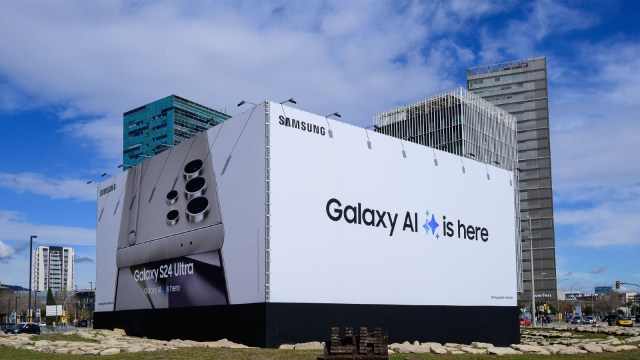If you step into Samsung’s shoes, as perhaps the biggest smartphone maker by volume, you realise there is constant pressure to get it right every time. There are certain expectations, and the entire industry looks at what the company does next — perhaps differently — but still ensuring the product reaches a broad user base.

Last year, around the same time, when Samsung debuted the new Galaxy S24 smartphone series, it marked the beginning of the AI story on smartphones. Since then, every brand, including Apple, has integrated generative artificial intelligence — ranging from rewriting messages to generating images based on a simple prompt — into its devices. However, the first wave of modern AI features felt more gimmicky than truly groundbreaking. In fact, many of the AI features seemed designed for specific use cases, though there were exceptions like Google’s Circle to Search and Samsung’s Sketch to Image tool that stood out. The industry, at large, is closely watching how Samsung expands on Galaxy AI, the company’s collection of AI software features, especially after Apple disappointed with Apple Intelligence.
“Galaxy AI will unquestionably be the number one narrative Samsung will push ahead,” Runar Bjorhovde, an analyst at Canalys, told indianexpress.com over email. Bjorhovde agrees that Samsung is making sure its Galaxy AI truly stands out from the competition, but whether the company manages to make AI an actual differentiator remains to be seen.
AI may be the tech buzzword right now, with every company racing to add the technology to their core services and products. However, for companies like Samsung and Apple, which reach billions of consumers with smartphones, the success of artificial intelligence depends largely on how quickly the domestication of generative AI happens.
The goal that tech companies have for AI is to create something more useful than OpenAI’s ChatGPT — technology that can simplify and access your day-to-day information, such as how you shop, where you travel, what you search, and what you read. AI will do it for you on your behalf like an “agent” that essentially plans your life. AI, in its current form, doesn’t do this. However, it can be when AI blends with the phone interface, and apps take a backseat while AI agents completely take over.
Samsung’s blueprint for others
 Samsung was the first major Android smartphone brand to introduce AI powered features. (Express Photo)
Samsung was the first major Android smartphone brand to introduce AI powered features. (Express Photo)
AI still has its own challenges as it remains prone to misunderstandings or “hallucinations” and lacks the ability to differentiate between what is factually accurate and what is not. But that is where companies like Samsung step in, working with Google and other software makers. However, the biggest play (at least, for now) is how seamlessly artificial intelligence blends into the interface and makes AI friendlier, almost personified. After all, smartphones are still the most accessible touchpoint from which to experience generative AI.
Story continues below this ad
What Samsung shows at its Unpacked event might be seen as a blueprint for others to replicate and make AI a core part of the everyday smartphone experience. Galaxy AI has a lot of good ideas, but not every feature is useful. And, Samsung needs to figure out how to make Galaxy AI a more integral part of the operating system — something Apple did with Apple Intelligence — but without making the same mistakes the iPhone maker made. The challenge, which others are also facing, is figuring out which AI feature has the most stickiness — the ones consumers will use most frequently and not just those that are used occasionally.
The Unpacked event may provide answers to what Samsung is envisioning in terms of making Galaxy AI a key selling point when consumers pick up the new Galaxy S25 series. Samsung has already demonstrated what an AI phone can do, but now it needs to take a step forward from its unfinished promise and work on making consumers habitual users of AI. Perhaps Samsung has figured out how to enhance AI and generate consumer interest in the technology.
At least, the teaser video released days before the event gives hope that Samsung has learned its lesson and is ready to improve the Galaxy AI experience. The clip shows a woman interacting seamlessly with Galaxy AI, asking it to find a pet-friendly Italian restaurant with outdoor seating, sharing the details with a friend, and adding the information to her calendar — all in one continuous flow. This suggests that the Galaxy S25 series will enable Galaxy AI to work across multiple apps on the user’s behalf. Is Samsung hinting at an AI agent? Probably yes, and the new functionality could be tied to Bixby AI assistant.
Upping the Galaxy game
 AI powered photo editor. (Express Photo)
AI powered photo editor. (Express Photo)
But how Galaxy AI is accepted among the mainstream crowd also hinges on how well Samsung plays its cards. Unlike in the past, when hardware drove sales volumes, which is still true, Samsung now wants Galaxy AI to drive higher sales of the Galaxy S25 series. That is how things are shaping up. To beat Apple in volumes and capture market share in the high-end segment, Samsung is aiming for higher sales of the Galaxy S25.
Story continues below this ad
“The importance of Samsung’s S-series devices cannot be understated. It serves as a key revenue and profit driver, branding flagship, center of the ecosystem, and high-end challenger. The Galaxy S-series is probably the only high-end model that has taken some market share globally next to Apple,” said Canalys’s Bjorhovde.
According to Canalys estimates, the S-series has improved significantly over the last few years, capturing a larger share of Samsung’s portfolio. In 2022, the S-series accounted for 15 per cent of shipments, in 2023 it made up 19 per cent of Samsung’s smartphone shipments, and in Q1-Q3 2024, it represented 26 per cent of shipments. For Samsung, the Galaxy S series is its mainline smartphone series, which drives volumes and keeps the brand active in the premium segment.
“The S24 series was a strong success for Samsung, where it found a narrative that worked through Galaxy AI, but was still very aggressive in using bundling and discounts to drive volumes. However, for Samsung to call the S25 series a success, I believe they need to see demand coming more directly from Galaxy AI, while creating excitement among the audience without relying on the same level of promotions,” said Bjorhovde.
Bjorhovde said Samsung is the only challenger to Apple at the top end of the market. “Many of the Chinese players have high-end ambitions, but volumes remain modest, as they often lack strengths in one or more categories. The common trend is that while the specs are often very strong, the brand positioning (or even brand awareness) is missing.”
Story continues below this ad
However, one challenge that Samsung has (including Apple) is how to increase interest in AI features among core high-end markets like North America and Europe. Until these phone makers solve this, it is unlikely they will be able to charge consumers for AI features, a topic that interests many due to the subscription angle.
When asked if Samsung would add an AI subscription to Galaxy smartphones soon, Bjorhovde said, “Samsung wants to attempt creating a Galaxy AI subscription model at some point in 2025, but it is currently difficult enough to get consumers to consistently use the features, which likely reflects low willingness to spend”.



 Samsung was the first major Android smartphone brand to introduce AI powered features. (Express Photo)
Samsung was the first major Android smartphone brand to introduce AI powered features. (Express Photo) AI powered photo editor. (Express Photo)
AI powered photo editor. (Express Photo)





